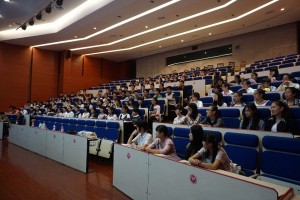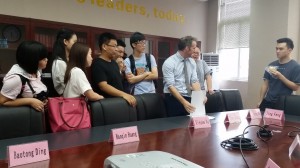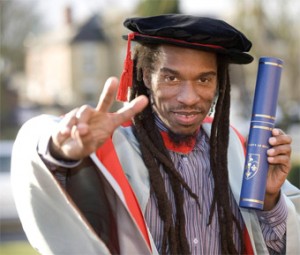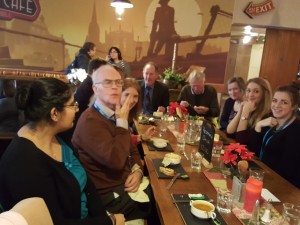Indecent, it’s bloody obscene!
Or
Human rights my arse!
or
Drop your trousers and Gough
This short story is based on the recent European Court decision in Gough v United Kingdom where it was held that the prosecution and imprisonment of Gough for indecency for repeatedly walking naked in public was a necessary and proportionate interference with his right to freedom of expression under article 10 of the European Convention on Human Rights. The characters are entirely fictional, apart from Gough himself; the scenario is also entirely fictional.
‘‘Elaine? Is that you? It’s Betty; I’m on me mobile phone. ‘‘Are you there? Yes? Oh, right. Well he’s arrived, that bloke on the news this morning – they said he’d be in Coventry today. You know, that bloke on the news, the one who walks about with all his clothes off. He was on the news – this morning. ‘’
‘You remember now? Blimey, Elaine, keep up. Well he’s here in town, walking down Gas Street, just wearing his rucksack and nothing else. Well apart from a bobble hat and some sandals. Yes, a bobble hat! Well it hasn’t got a bobble on it so I suppose it’s just a hat, isn’t it? What colour’s the rucksack? Well that’s a right bloody silly question to ask isn’t it? The man is naked Elaine! Naked in Gas Street! And on a Tuesday as well!’’
‘‘Hang on, there’s a crowd now. I can’t see anything. Well would you believe it? That Charmaine Harris is there, right in the thick of things. Thought she’d be there, bloody shameless she is! Anywhere there’s naked man on the loose, you’re sure to find her. You know she’s had affairs with two of our vicars, don’t you? Yes two – old droopy drawers Jones who died, and the young chap who came last year and left suddenly. It’s true, my Bill caught her giving him a wotsit in the bowls pavilion.’’
‘Wait on, he’s escaped Charmaine Harris and is running towards Greggs. Blimey, that’s not a pretty sight. He needs some pants on, he does. Hang on, he’s stood on the council steps and waving his arms about, blimey everything’s flapping now …Is he what? No not really, but it is cold! That’s always the case, isn’t it? Those who go about without no clothes on are the ones you wouldn’t want to see in the nuddy. Like that chap on holiday last year, remember, the one who was naked on the beach, then came into the tea rooms with it all dangling? Well, as you said, he was no Leonard Caprio, was he? No, this one is nothing to write home about I’m afraid. Not that you would write home about that sort of thing, would you?’’
‘‘Hang on, Jackie James from the Herald has arrived. From the Herald yes, delivered on a Thursday. No, I haven’t had mine for weeks; they seemed to have stopped delivering it now; although old Mister Brown says that the students take it from the letter boxes and use it as wotsit paper.’’
‘’Young Jackie is interviewing the naked bloke now, thrusting his microphone into him. He ought to be careful. He doesn’t look very comfortable, does Jackie, well you wouldn’t would you? Having to stare at that when you’re trying to ask questions.’’
‘‘Hang on, the cameras have just rolled up now – here, it’s that bloke from the BBC news, the one with the eyes. No not the nice Welsh one, no not him, he wouldn’t come here just to see naked men, would he? He goes to royal weddings and does the important stuff; he knows the Queen, you know. Imagine if he was asked to come to Coventry and interview a man wearing just a rucksack and sandles?’’
‘‘Hang on the police has arrived now…’’
_____________________________________________________________________
On the bed that he has slept in for the last forty years, lays the dead body of a man: a man married for 55 years, retired for ten; a man who believes he has achieved nothing in life, who has not really loved or been loved; a man made ill and eventually killed by the shame brought upon him by a son who had no respect for his father, decency, morality or society. He is now at peace and soon will be forgotten by everyone, whilst his son will become famous, and infamous, for the awful things that he has done, and which are now out there in the public. He will be talked about on the news, in the streets and by academics, who will examine his behaviour and publish papers on it; and everyone will question why he did this thing, and why he brought shame on his family, and whether it was really the father, the mother and society that was to blame.
‘‘Oh, bloody hell! This puts the tin hat on it, this does. That bloody lecturer from the college has arrived and they’re interviewing him. You know the one, works at the college, always on the radio talking about human rights. Human rights my arse is what I say. Yes, Molly Forster’s lad, well lad, he must be sixty now. Yes, that’s him, well he’s talking a lot of old shite now, to the telly man.’’
‘‘… I appreciate that Mr Gough’s appearance may well be causing some distress to some, but in a democratic society imbued with broadmindedness and pluralism, surely it is an affront to liberalism and tolerance that his alternative life style choice is restricted by arrest and imprisonment. Surely, in such a society…’
‘‘What a lot of cobblers! He needs a good slap that one. Bill the butcher was telling me that his granddaughter goes to his classes and that he’s always talking about gay rights. Well, that’s not right is it? Here, you don’t think he’s a wotsit, do you? Oh, did he? That bloody woman gets everywhere! Well there’s something wrong with him. She says he’s always banging on about transvestites, prisoners and torture; and his Mum was a lovely woman she was. He was on the radio the other day saying prisoners should be able to vote! Yes, vote! What a bloody liberty. I agree with that nice Mister Cameron. He says that if prisoners are allowed to vote that would make him sick. Well, he’s right isn’t he? No bloody sense in it.’’
‘‘Oh, hell, now it’s all starting to kick off. Two policemen are trying to cover him up with their helmets, and he’s knocking them away and running round by Baz’s video shop.’’
‘’Hang on a minute Elaine, ‘three pounds of potatoes a cucumber and some Pink ladies, please’. What? Yes, I’m in the greengrocers, getting some bits and pieces for tea. Yes, I’m looking out the widow, although Big Gloria from South Street is in the way, can’t see nothing now.’’ Ooo, there he is again and he’s just tripped over Baz’s dog… blimey I bet that hurt!’’
‘’Well, better be going. Oh, nearly forgot, Bill died last night. Sudden like. Bill who? My Bill of course, which other bloody Bill is there? Get a grip Elaine! Well I’m sorry as well, but there you go, he was seventy three you know. Yes, seventy three, he was. No he wasn’t seventy five Elaine, be told! Look Elaine, I should bloody know, he was my husband, he was seventy blinking three. Anyway, I’m off now, got things to arrange, see you at bingo Saturday. Oh, the police have just carted him off – no not my Bill, the bloody naked man. I expect he will be glad to get into the warm.’’
… this sort of liberty would be in jeopardy if the current government pursues its plans to repeal the Human Rights Act and leave the European Convention on Human Rights.’’
‘‘Thank you Doctor Forster. This is Jonathon Morris, BBC news, Coventry.’’
‘‘Hello, Mrs Hutton, it’s Stan Forster, Molly’s son. How are you, and how is Mister Hutton?
‘Dead.’
‘Oh, I am sorry.’ My condolences Mrs Hutton.’’
‘Well, you should be…it’s people like you, with your bloody human rights. Not everyone deserves human rights you know. Some people have done things, bad things, bad things to other people … they don’t deserve to be treated like human beings. They’re animals.
‘‘And him over there, with all his tackle open to the elements. It’s bloody indecent, that’s what it is. What if I decided to take my clothes off and walk into your lectures, all naked, you wouldn’t like that would you?’’
‘‘No. I don’t suppose I would Mrs Hutton, but …’’
‘‘But nothing, you wouldn’t like it because it is not very nice to be walking about naked in a public place, with all your bits and pieces on display. There’s no bloody standards these days. No one is safe.’’
‘’I see Mrs Hutton. You are, of course, entitled to your opinion, freedom of expression and all that. Even if it does cause offence.’’
‘Yes, I suppose you are right, I am entitled to that aren’t I?’’
‘’Well goodbye Mrs Hutton
‘’Yes, goodbye… you arsehole’’
‘Mrs Hutton is it? Jonathon Morris from the BBC. I wonder whether you could spare us a few moments to give us another perspective about this case?’’
‘’What, me on the telly? Oh, go on then.’’
Doctor Foster closed his eyes and muttered darkly. ‘Bloody free speech!’







